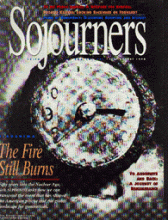When I tell people I live in Washington, D.C., a common reply is, "I'm sorry to hear that." When a former D.C. paramedic discovered which neighborhood I live in, he didn't bother with condolences, he just told me I was "crazy." Friends responding to my Christmas letter about my experiences in the city wrote back words of comfort. All this has me wondering: Is a decision to live in the city cause for sympathy these days?
Indeed, violence rears its ugly head often on these streets, usually under cover of darkness, and that's what people hear about. And yet neighbors persist in greeting one another, quietly fighting back the fear behind the headlines. Vulnerability and grace walk hand in hand.
Why do I live in the city? Am I just "asking for trouble," as some say? Can I talk about my everyday experiences without promoting the very fear and judgment I seek to dispel?
I live in the city to be a witness against violence and injustice, and to experience firsthand its human and structural dynamics. As a result, diminished dignity and the pressures of poverty are not merely concepts to me. When I stand in long lines at the few grocery stores, where prices are higher than in the suburbs and the food is lower quality, I understand demoralization; when I allow encounters with human tragedy to become part of my prayer life, rather than denying they exist, I understand the paradox of faith as my trust in God deepens. Meanwhile, I have the opportunity to share the satisfaction of organized neighbors who finally closed the crack house around the corner, and I am challenged when one of them offers assistance to those displaced-the same people who had kept him up nights for so long.
Read the Full Article
